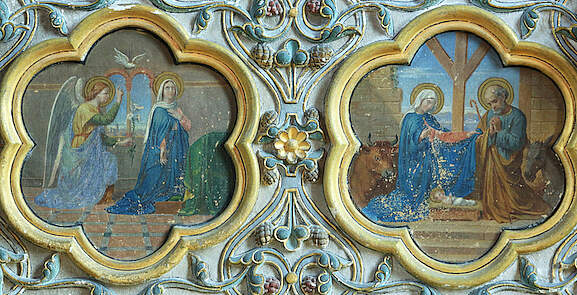
Mary’s very feminine "Here I am" – Behold, I am the handmaid of the Lord. May it be done to me according to your word (Lk 1:38) – has been extended to the Church, to the human race, and finally to the whole of creation, embracing us in the essential vocation of a spouse, who is available and given, and says: "Here I am, Lord!"
The feminine spirit that reveals the scope of this universal "Here I am," present in all things, is really at the core of all created beings as they stand before their God and Creator.
This perspective is not primarily—and this is very important—about gender or sexuality, but about the metaphysical relationship between the Divinity and Creation, as God wills it and builds now in me, everywhere, and always.
This femininity we are talking about is a quality of the deep and universal being. It is an intrinsic, fundamental and dynamic quality, all oriented towards its Creator who made that being for Himself. Thus, whether pronounced by a man or a woman, the biblical "Here I am" is rooted first of all in the fundamental femininity of the created being. Femininity expresses entirely the religious vocation of Creation as a whole.
The woman, every woman, is like the Representative or Ambassador of universal femininity: she is its privileged "spokesperson," and this vocation of every woman is then perfectly fulfilled—how much so—in Mary’s "Here I am," in the name of all fundamental femininity.
It is there to remind us all of our vocation, which is in itself a religious vocation… As Paul Evdokitnov rightly puts it: "In the religious sphere, it is the woman who is the stronger sex."
Hence, for a woman—provided that she is called to it—the religious consecration of her whole person is a privileged enhancement of her deepest being, of what she is, and of what she represents in the Church and in the world.
Holiness, the Church’s ultimate goal, is thus fundamentally feminine... because it is akin to what a wife and marriage represent. And it is entirely contained in the intimate, total, and definitive answer "Here I am" that we give to God.
God is not known—in the biblical sense of the word—in a conceptual or intellectual way, but "nuptially," as Eastern tradition tells us. That is to say, through our whole being given the thrice Holy God as we say "Here I am Lord."(1)
(1) The author goes on to explain that the ordination of women would obliterate the vocation of Creation, humanity and the Church, something St John Paul II wrote in his encyclical Mulieris Dignitatem.
Father Yves Fauquet
Excerpts from Yves Fauquet, "Voici et me voici dans la Bible" (Here I Am in the Bible), Anne Sigier editions, Paris 2003.